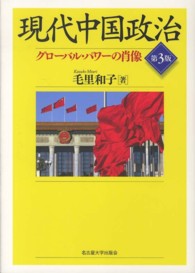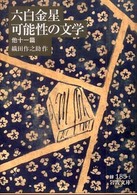- ホーム
- > 洋書
- > 英文書
- > Philosophy
Full Description
Plato's dialogues stand at a transition from orality to literacy. They are living contradictions—partly oral and partly literary. This relationship between orality and writing is one of the most vexed issues in the history of Platonic interpretation and has particular relevance for the progressive erosion of literacy in favour of digitalisation today. This book argues that the relationship between the oral and the written in Plato's dialogues is not a straightforward opposition, but is instead grounded in ontological analysis and exemplified by the ontology of the image, which appears throughout the Platonic canon.
Contents
Abstract
Acknowledgements
Premises
Introduction
1 The Critique of Writing in Plato's Works
1 "I Have Discovered a Potion for Memory and for Wisdom"
2 "If the Author Is Really Serious, This Book Does not Contain His Best Thoughts"
3 "If a Man Has Nothing More Valuable Than What He Has Composed or Written"
4 "Nothing More Valuable"
5 "He Will Sow Gardens of Letters for the Sake of Amusing Himself"
2 The Critique of Orality in Plato's Works
1 Orality and Vocality
2 Myth and Philosophy
3 The Arts and the City
4 Hermeneia and Responsibility
5 Image-Making
3 The Ontology of the Image in Plato's Works
1 Eidos and Eidolon
2 The Ontology of the Pseudos
3 Mirrors and Paidia
4 Beauty and Wonderment
Conclusion
Afterword
Bibliography
Index







